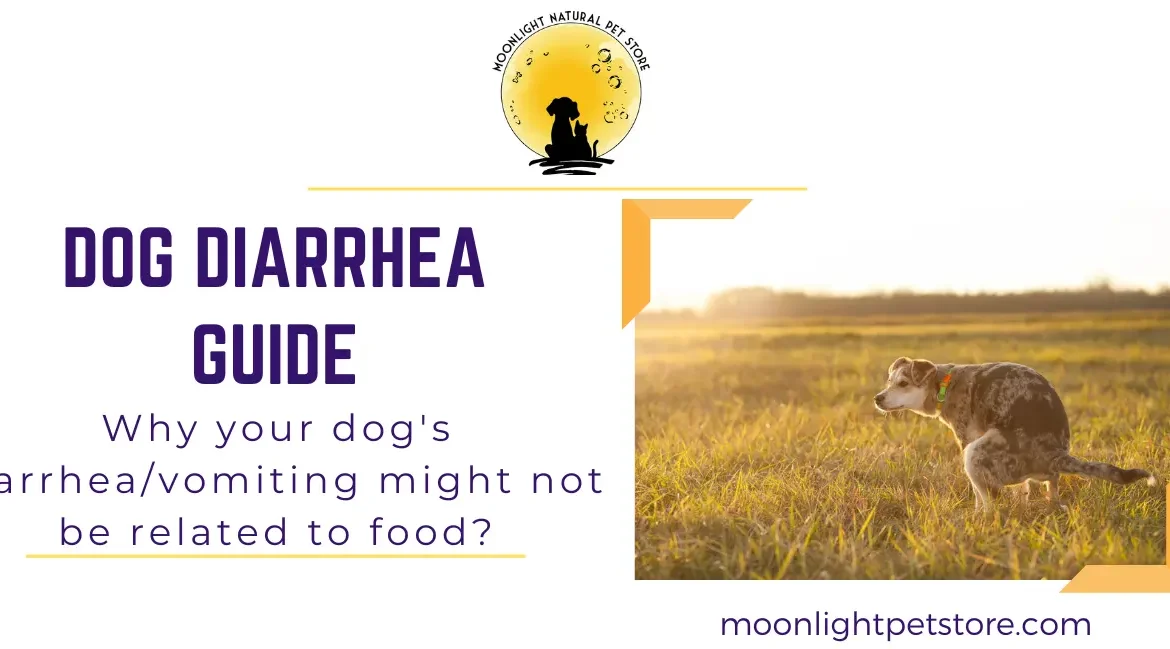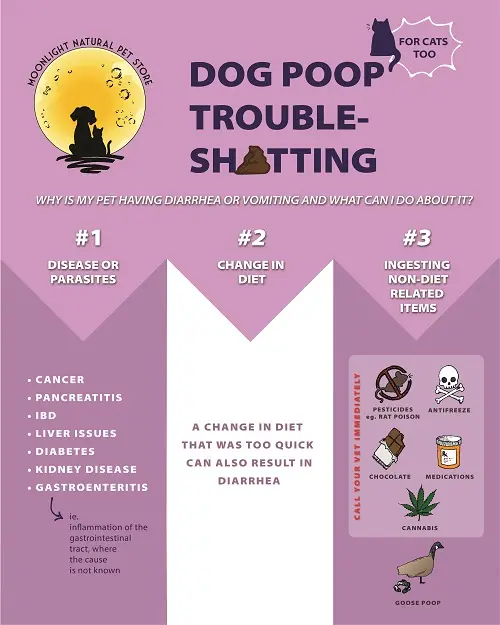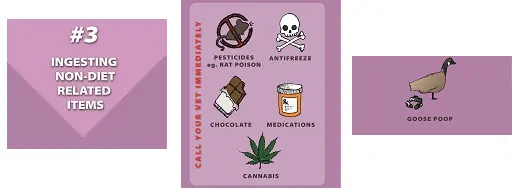
How To Fix Dog Diarrhea Guide: Effective Home Remedies, Prevention Tips & When To See A Vet
Dog Troubleshitting Guide: Why Your Dog’s Diarrhea or Vomiting May Not be Related to Pet Food
Typically, around January, early February in British Columbia, pet stores and vets see a larger number of dogs diarrhea and/or vomit. Dog parents initially start with dog diarrhea home remedies by either fasting their dog for 12 hours or giving bland dog food with or without success. Some may add pumpkin or slippery elm to the dog’s food and proceed to try to change the dog food with some improvement in dog diarrhea or none at all. When the diarrhea does not resolve itself, dog parents would then take their dog in to the vet who might conduct a fecal examination and give you medication/ dewormer that might resolve the issue. This cycle is probably replicated in Canada or the Northern USA through the Spring till Fall. Our Dog Troubleshitting Guide is a checklist that could help:
1) Save your pet’s life (priceless) because you act quickly to see a vet/emergency vet or
2) help you save at a minimum about $250 (a secondary vet visit for other diagnostic testing because you didn’t take the poop in). We coined the term Poop, Scoop and Test to describe the first thing you should do. Pick up what you can of the dog/ cat poop for the vet clinic to test even if you don’t have an appointment.
For the checklist, skip directly to the Dog Troubleshitting Guide section or the Infographic.
What Causes Dog Diarrhea or Vomiting?
Note that there are loads of issues resulting in dog diarrhea or vomiting. In this guide, we’ll cover:
- The main causes for dog or cat having diarrhea and/ or vomiting
- Common household items that could cause your pet to have diarrhea
- Salmonella, E.Coli, Giardia and the causes and treatment for dogs
- Step-by-step guide on what to do if your dog has diarrhea or vomiting and what information to provide to your vet for further diagnostics.
Without further ado, let’s dive in.
The Main Causes of Dog Diarrhea and/or Vomiting
- Disease or parasites
- Change in diet
- Ingesting non-diet related item

A non-exhaustive list of diseases that might cause dog diarrhea or vomiting include cancer, pancreatitis, IBD, liver issues, diabetes, or kidney disease. In some cases, if the cause is unknown, it is labeled as gastroenteritis, which is basically inflammation of the gastrointestinal tract.
A change in diet that was too quick could also result in diarrhea. We’ll have another blog dedicated to how to transition pet food at some point. Alternatively, you can read our tips on Method 2 of transitioning from kibble to raw dog food, as some of those are still appropriate for any diet change.
This article is focused on Subject #3 Ingesting non-diet related items as during January through September, we see a lot of customers informally reporting #3 to us. This is a common reason why dogs end up going to a vet or emergency care.
How Does Ingesting a Non-diet Item Cause My Dog/Cat to Have Diarrhea or Vomiting?
Dogs can explore the world through their mouth and some of them often do soo quickly by eating something off the floor that owners cannot react in time.
Here are some of the household/readily available things that you need to ensure your dog does not ingest. Note that the first 5 items can constitute vet emergencies as they can result in organ failure/be fatal. Marijuana can be fatal for cats and dogs depending on the amount ingested.
CALL YOUR VET if you think your dog or cat has eaten or swallowed any of the top 5 following:

- Pesticides (e.g., rat poison) are now made quite palatable for rats to eat but can also entice dogs or cats. Vomiting and diarrhea are symptoms, and this is a vet emergency. Pesticides are typically used in Fall, when it is getting colder, and rats are more likely to move indoors. BC has temporarily banned the use of rodenticide although restaurants and grocery stores are part of the exempt groups.
- Antifreeze – ethylene glycol is toxic in dogs. It can take as little as licking a few drops for a dog to get a lethal dose. Again, this is a vet emergency. Make sure to clean up your garage if brake fluid leaks from your car or motorbike. A lot of people sometimes store a secondary car/ convertible until the weather gets warm. Prevent your dog from drinking from places where antifreeze is added to prevent toilet pipes from freezing.
- Chocolate has theobromine and caffeine, which are slowly absorbed by dogs. These can cause vomiting and diarrhea depending on how much your dog ate, the type of chocolate and how big your dog is. Call your vet to ask for directions on what to do. Chocolate is a problem during and after the Christmas holidays, Valentine’s Day, and Halloween.
- Medications – call your vet immediately.
- Cannabis can cause your dog to vomit excessively and drool. I added Cannabis to this list as it is now legal in Canada and lots of vets are seeing dog’s showing cannabis poisoning. The cannabis poisoning can be from the second-hand smoke or your dog/ cat ingesting edibles or cannabis directly. This is quite serious so please take your dog or cat in to the vet if they are drooling/ lethargic/ restless, and/or having ataxia (difficulty controlling movement).
- Goose poop –could lead to vomiting and diarrhea.
You will likely have heard of the first 5 items as they are quite well-documented. However, from Spring till Fall, we find that goose poop is usually implicated though not widely known for causing diarrhea and/or vomiting in dogs.
Why Should You Stop Your Dog From Eating Goose Poop
Dog owners do not typically consider goose poop as the cause of their dog diarrhea or vomiting. Usually, dog owners consider their dog eating goose poop as a gross but harmless activity.
However, goose poop can contain salmonella, virulent strains of E-coli, Campylobacter – Helicobacter & Clostridium botulinum. All of these are bacterial infections causing gastrointestinal issues. In addition, goose poop can have giardia.
This is based on a study using a One Health approach. The World Health Organization is a proponent of One Health Initiative. This approach “is to create common ground for several disciplines in order to establish more holistic approaches to diseases shared by more than one species.”1
The study focuses on zoonotic disease and the impact on primarily humans and livestock. The study also “analysed E. coli in Canada geese in the USA, found that more than 95% of their isolates (n = 47) was resistant to a variety of antibiotic substances, such as ampicillin, cephalothin, and sulfathiazole.”1 This is particularly important as vets may treat dog diarrhea underlying cause by prescribing Metronidazole (Flagyl) and when that does not clear the illness switch to fenbendazole (Panacur) or vice versa in the treatment of giardia.
For more information on Salmonella, E-Coli, Giardia see here.
Dog Troubleshitting Guide
Our Dog Troubleshitting (all puns intended) is about quickly assessing what the potential causes of your dog’s diarrhea and vomiting could be. It is a quick checklist going through a number of items that pet parents might not consider.
This checklist could help
1) Save your pet’s life (priceless) because you act quickly to see a vet/emergency vet or
2) help you save at a minimum about $250 (a visit for other diagnostic testing because you didn’t take the poop in). We coined the term Poop, Scoop and Test to describe the first thing you should do. Pick up the dog/ cat poop for the vet clinic to test even if you don’t have an appointment.
Note that we are not vets and are providing this guide to help you talk to your vet. We find customers do not ask enough questions and settle on resting the dog’s stomach instead of calling a vet. That could potentially miss an important vet emergency.
- Disease or parasites– Does your dog/ cat have any diagnosed illnesses? Y/ N
- pancreatitis,
- cancer,
- IBS
- Liver or kidney disease
- Diabetes
- other?
What to do if your pet has an already diagnosed disease
- When was the last bloodwork or annual check up for your pet?
- When your dog poops blood, ask yourself the following questions. What is the dog poop colour? Does your dog’s poop look like there is blood in their dog’s poop. Is it fresh coloured blood or digested blood? e.g., tarry black poop. Let the vet know or take in a sample asap as this is an emergency.
- Poop, Scoop and Test. we coined this term to describe the first thing you should do. Pick up the dog/ cat poop for the vet clinic to test even if you don’t have an appointment. This is an important part of diagnostics that pet parents sometimes fail to understand.
- Is your cat or dog on any drugs or antibiotics? (Write them down and let your vet know.)
- Call your vet asap to book diagnostic testing usually bloodwork, urinalysis or sometimes ultrasounds!
2. Change in diet – have you changed your dog or cat’s diet recently? Y/ N
- If yes, what did the dog/ cat eat?
- Was it a slow transition to the new food or an immediate change? (Read method 2 of this link for slow transition here.)
- If it was a slow transition, has your pet tried that particular protein in the past?
- If no, then look at diseases or #3 for issues with ingestion.
- Poop, Scoop and Test. Pick up the dog/ cat poop for the vet clinic to test even if you don’t have an appointment.
- Pet Food Sensitivities/ Allergies – Does your pet have food sensitivities to a particular protein e.g., chicken or beef?
- Cat Vomiting – Is your cat long-haired and does it groom incessantly?
- Sometimes cats who groom constantly tend to vomit frequently. The hairball could be lodged in your cat’s system so that whenever it eats, it ends up throwing up. You may sometimes find a hairball or not.
- Try using Vet’s Best Hairball Relief to resolve this vomiting. It contains slippery elm.
- Dog Vomiting – how often is it happening. If there were chunks of pet food and it happens only after eating. Your dog may have eaten too fast (if vomit happened quickly ~<2 hrs?).
- Is it a short-snout dog e.g., French bulldog/ Frenchie, Pug? Does it have a soft palate issue? Elevate your pet food and prevent the dog from playing directly after eating. Discuss soft palate issues with your vet.
Other than diarrhea, if your dog or cat is acting normally and is healthy, you could try the following.
Home Remedies for Dog Diarrhea. How to Stop Dog Diarrhea
- Rest your pet’s stomach. Give your pet’s stomach a rest from the normal food it eats for about a day or two.
- Feed a bland dog food diet for a few days. You could give either bone broth, kefir, pureed whole pumpkin for dog diarrhea. Use bland diets without fat to ensure that your pet’s diarrhea does not get worse.
- Water – always provide water to prevent dehydration. Dehydration can trigger nausea in pets. In serious situations of dehydration, please visit the vet for IV fluids.
- Use Slippery Elm – use slippery elm to stop dog diarrhea. About ¼ tsp of powder for every 10 lbs mixed in bland food or water. Honest Kitchen Perfect Form contains slippery elm.
- Consider Dog/ Cat Probiotics. If your pet was on antibiotics, we’d recommend using probiotics for dogs/ cats to help rebalance your pet’s gut flora.
- Should you change your pet’s diet to veterinary diets dog food? For humans, doctor’s don’t put people with diarrhea on a new diet. You just eat bland and nourishing foods. Same with pets.
- Let the cat or dog sleep so that they can recover.
- Take a stool sample to the vet if the pet’s diarrhea is not resolved.
3. Ingesting non-diet item – Did your dog or cat ingest any goose/cat/dog poop, sticks, cooked bone or drink from a puddle etc. ? Y/ N
- If IN DOUBT about what it ingested and your dog/ cat is not acting normal, call your vet!
What to do if pet has ingested/ swallowed a non-diet item
- Poop, Scoop and Test. Pick up the dog/ cat poop for the vet clinic to test even if you don’t have an appointment.
- Ask your vet for bloodwork, urinalysis, and X-ray to help them eliminate the possibilities.

How to Prevent Salmonella, E. coli and Giardia in Dogs and Cats
Why does the FDA have a zero-tolerance policy against salmonella in pet food? The FDA made this change as preventing salmonella is more about ensuring that humans that live with pets do not get sick.
There is already knowledge that dogs and cats may tend to carry salmonella already. They are also able to deal with some loads of salmonella or E. coli infection without being symptomatic.
- Please prevent your dog from eating goose/ dog/ cat poop or drinking from outside standing water. This is especially important for puppies!
- Use a portable dog bottle.
- Buy your dog a muzzle if it is quicker at eating items outside than you can prevent it.
- Use dog wipes to clean their paws/ wash the paws when you get home.
- Pick up dog poop with a poop bag without holes in it.
- Wash your dog bowl for food and water daily.
- Practice good hygiene. Wash your hands after picking dog poop, touching pet food (kibble and raw alike) as well as treats.
- Wipe your dog’s mouth with a dedicated face towel that is frequently washed.
- After diarrhea or vomiting, clean and disinfect household surfaces, your pet’s bed, toys, and/or cat litterbox.
- Wash the dog or cat completely if diarrhea or vomit is caked on their hair, wear gloves if possible.
Conclusion
Note that this guide is to help you think of all the possibilities of why your dog/ cat is having diarrhea/ vomiting. They are not meant to replace Vet advise. The suggestions are provided to help you give your vet better information so that your vet in turn can provide better diagnostics for your pet.
How do you know when dog diarrhea is a medical emergency? Follow our dog diarrhea guide and when in doubt, call your vet asap.
Please comment to let us know what you think about this guide? Is there something you would have liked us to include in this guide? Let us know by leaving a comment below.
References
- Potential disease transmission from wild geese and swans to livestock, poultry and humans: a review of the scientific literature from a One Health perspective. by Johan Elmberg, Charlotte Berg, Henrik Lerner, Jonas Waldenström, and Rebecca Hessel https://www.ncbi.nlm.nih.gov/pmc/articles/PMC5443079/
- Salmonellosis in Animals by Walter Grünberg , DVM, PhD, DECAR, DECBHM, Faculty of Veterinary Medicine, Justus-Liebig-Universität Giessen, Giessen, Germany. Last full review/revision Aug 2020 https://www.merckvetmanual.com/digestive-system/salmonellosis/salmonellosis-in-animals?query=salmonella
- Raw Meat Diet transcript from Dr. Karen Becker https://karlaspets.com/wp-content/uploads/2016/03/Dr-Becker-Raw-Diet-Article.pdf
- E.coli infection https://www.cdc.gov/healthypets/diseases/ecoli.html
- Effectiveness of Fenbendazole and Metronidazole Against Giardia Infection in Dogs Monitored for 50-Days in Home-Conditions https://www.ncbi.nlm.nih.gov/pmc/articles/PMC8032893/
- Survey of Canada goose feces for presence of Giardia https://faculty.cnr.ncsu.edu/christophersdeperno/wp-content/uploads/sites/8/2016/01/PR91-GiardiainGeeseHWI.pdf
- Giardiasis https://www.cfsph.iastate.edu/Factsheets/pdfs/giardiasis.pdf
- CDC Giardia and Pets https://www.cdc.gov/parasites/giardia/prevention-control-pets.html
- Giardiasis http://www.merckvetmanual.com/digestive-system/giardiasis-giardia/overview-of-giardiasis


